Project managers are the backbone of any project, ensuring smooth execution and successful completion. They coordinate tasks, manage resources, and maintain communication among all stakeholders.
Essential skills for a project manager include leadership, time management, and risk assessment, along with technical know-how relevant to the project’s industry. Assessing these skills effectively is crucial for hiring the right candidate.
Candidates can write these abilities in their resumes, but you can’t verify them without on-the-job Project Manager skill tests.
In this post, we will explore 8 essential Project Manager skills, 10 secondary skills and how to assess them so you can make informed hiring decisions.
Table of contents
8 fundamental Project Manager skills and traits
The best skills for Project Managers include Project Planning, Risk Management, Budget Management, Team Leadership, Communication, Quality Control, Stakeholder Management and Time Management.
Let’s dive into the details by examining the 8 essential skills of a Project Manager.
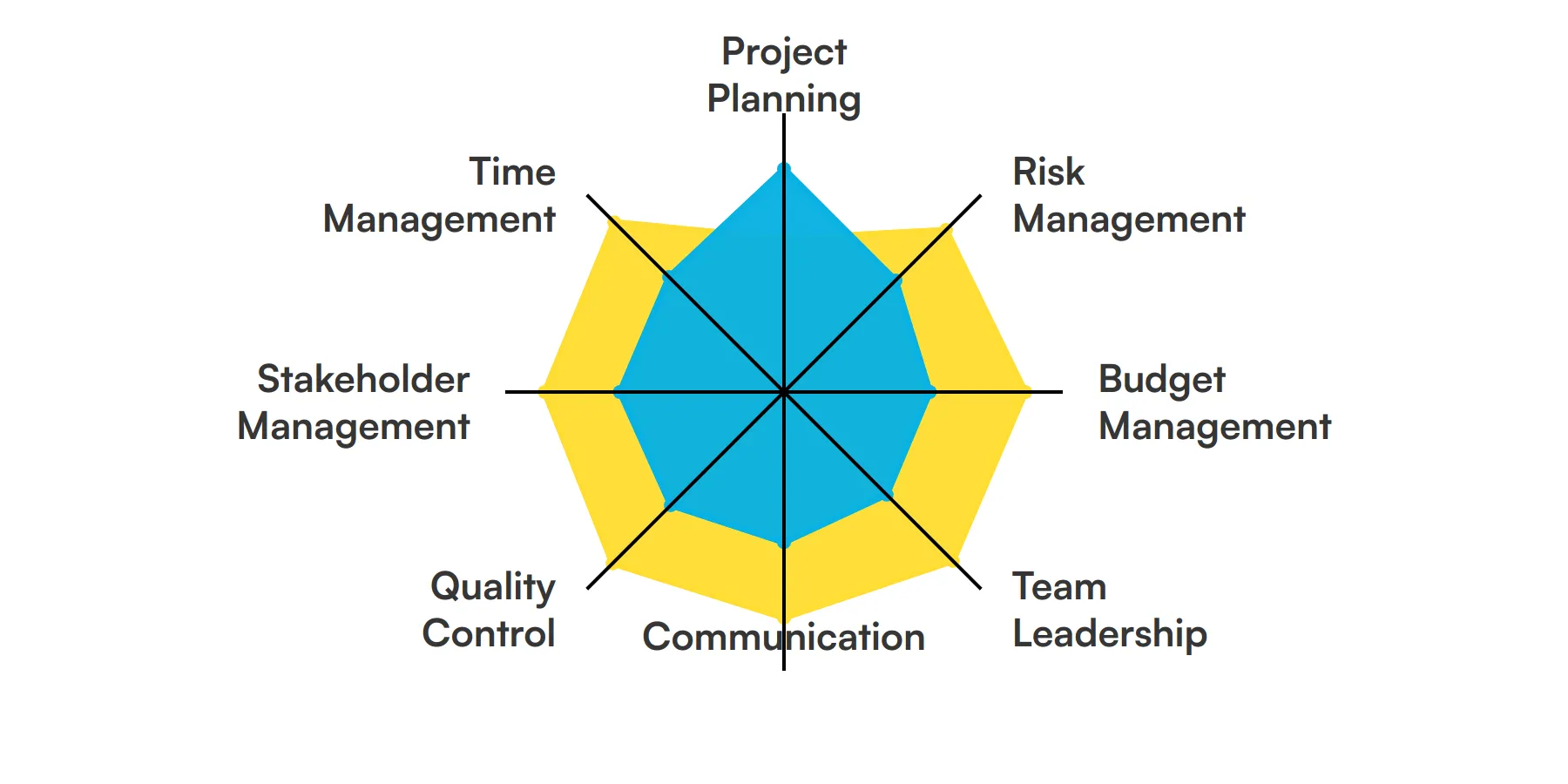
Project Planning
Project planning is fundamental for a project manager to outline the project's scope, resources, and timeline. It involves breaking down the project into manageable tasks and setting realistic deadlines to ensure timely completion.
For more insights, check out our guide to writing a Project Manager Job Description.
Risk Management
Risk management allows project managers to identify potential risks, assess their impact, and develop strategies to mitigate them. This proactive approach helps in maintaining project stability and ensures that it stays on track despite uncertainties.
Budget Management
Controlling the project budget is crucial for a project manager to ensure that the project does not exceed financial resources. It involves monitoring expenses, forecasting costs, and making adjustments to stay within budget.
Team Leadership
Effective team leadership involves guiding and motivating the project team to achieve their best performance. A project manager uses this skill to foster a collaborative environment and resolve conflicts among team members.
Communication
Clear communication is key in managing both stakeholders and team members. It ensures that everyone is aligned with the project goals and understands their roles and responsibilities.
Quality Control
Ensuring the project meets the set quality standards is critical. A project manager uses quality control processes to measure project outputs and make necessary adjustments to deliver the best possible outcomes.
Check out our guide for a comprehensive list of interview questions.
Stakeholder Management
Managing stakeholders involves engaging them in the project process, understanding their needs and expectations, and ensuring their satisfaction. This skill is essential for maintaining support and securing project resources.
Time Management
Time management is essential for project managers to prioritize tasks, set milestones, and meet deadlines. Effective time management helps in achieving project goals within the designated timeframe.
10 secondary Project Manager skills and traits
The best skills for Project Managers include Contract Negotiation, Change Management, Resource Allocation, Problem Solving, Technical Proficiency, Documentation, Reporting, Adaptability, Conflict Resolution and Process Improvement.
Let’s dive into the details by examining the 10 secondary skills of a Project Manager.
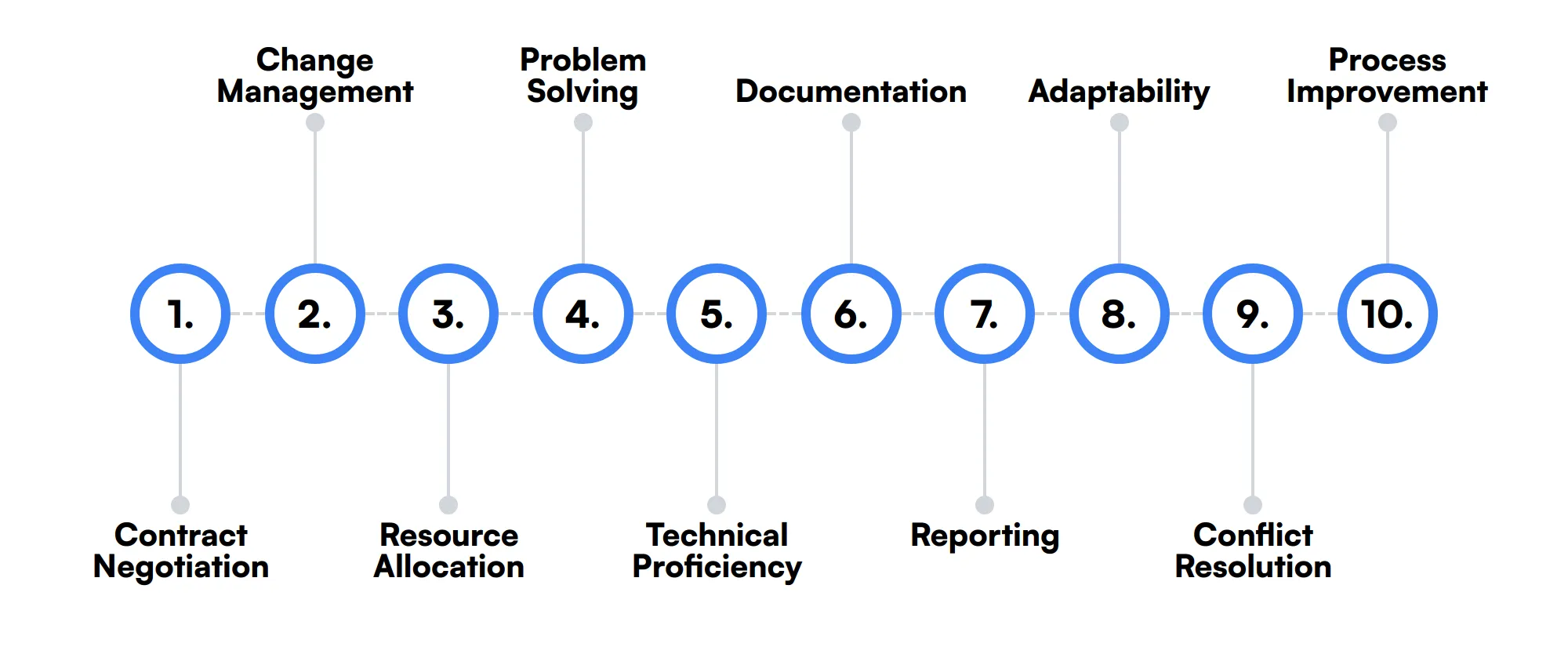
Contract Negotiation
Understanding and negotiating contracts with suppliers and clients is a valuable skill for project managers to ensure favorable terms and clarity in project expectations.
Change Management
Project managers must be adept at managing changes to the project scope or objectives, ensuring that changes are smoothly integrated without disrupting the project flow.
Resource Allocation
Efficiently allocating resources, including personnel, tools, and materials, is necessary to maximize productivity and prevent resource shortages or excesses.
Problem Solving
The ability to quickly identify problems and devise effective solutions is crucial for keeping the project on track and maintaining team momentum.
Technical Proficiency
Project managers often need a good understanding of the technical aspects of their projects to effectively manage technical teams and address technical challenges.
Documentation
Accurate documentation is necessary to keep all project stakeholders informed and to maintain a clear record of project progress and decisions.
Reporting
Regular reporting on the project's status to stakeholders is important for transparency and for making informed decisions about the project's future direction.
Adaptability
The ability to adapt to changing conditions and project demands is important for managing unexpected challenges and opportunities.
Conflict Resolution
Resolving conflicts within the team or with stakeholders promptly and effectively is important to maintain a positive working environment and project cohesion.
Process Improvement
Identifying and implementing process improvements can lead to more efficient project execution and higher quality outcomes.
How to assess Project Manager skills and traits
Assessing the skills and traits of a Project Manager is a nuanced process that involves more than just reviewing a resume. While educational background and certifications provide a snapshot, they don't fully reveal a candidate's ability to lead a project from inception to completion. Understanding how to evaluate these skills effectively is key to finding the right Project Manager for your team.
Project Managers are expected to excel in areas such as Project Planning, Risk Management, Budget Management, and more. Each of these skills plays a critical role in the successful delivery of projects. However, assessing these competencies can be challenging without the right tools.
This is where Adaface assessments come into play. By utilizing tailored assessments that focus on real-world scenarios, you can measure a candidate's proficiency in Project Planning, Team Leadership, and other essential Project Management skills. Adaface assessments are designed to help you identify top talent efficiently, boasting a significant 85% reduction in screening time.
Let’s look at how to assess Project Manager skills with these 5 talent assessments.
Project Management Test
Our Project Management Test assesses a candidate's ability to plan projects from conception to implementation, map timelines, assess risks, allocate budgets, execute the project life-cycle in a phase-wise manner, manage stakeholders, debug issues and deliver a product or service.
The test evaluates skills such as cost and budget estimation, situational judgement, understanding of key project roles and stages, designing a project plan, resolving issues and handling changes, and managing and controlling resources. It also covers stakeholder management, prioritizing tasks in real-time, and the basics of agile project management and Scrum as well as traditional (waterfall) project management.
Successful candidates demonstrate proficiency in risk analysis, creating and analyzing project reports, and the ability to take ownership of a project and work with a team to deliver it.
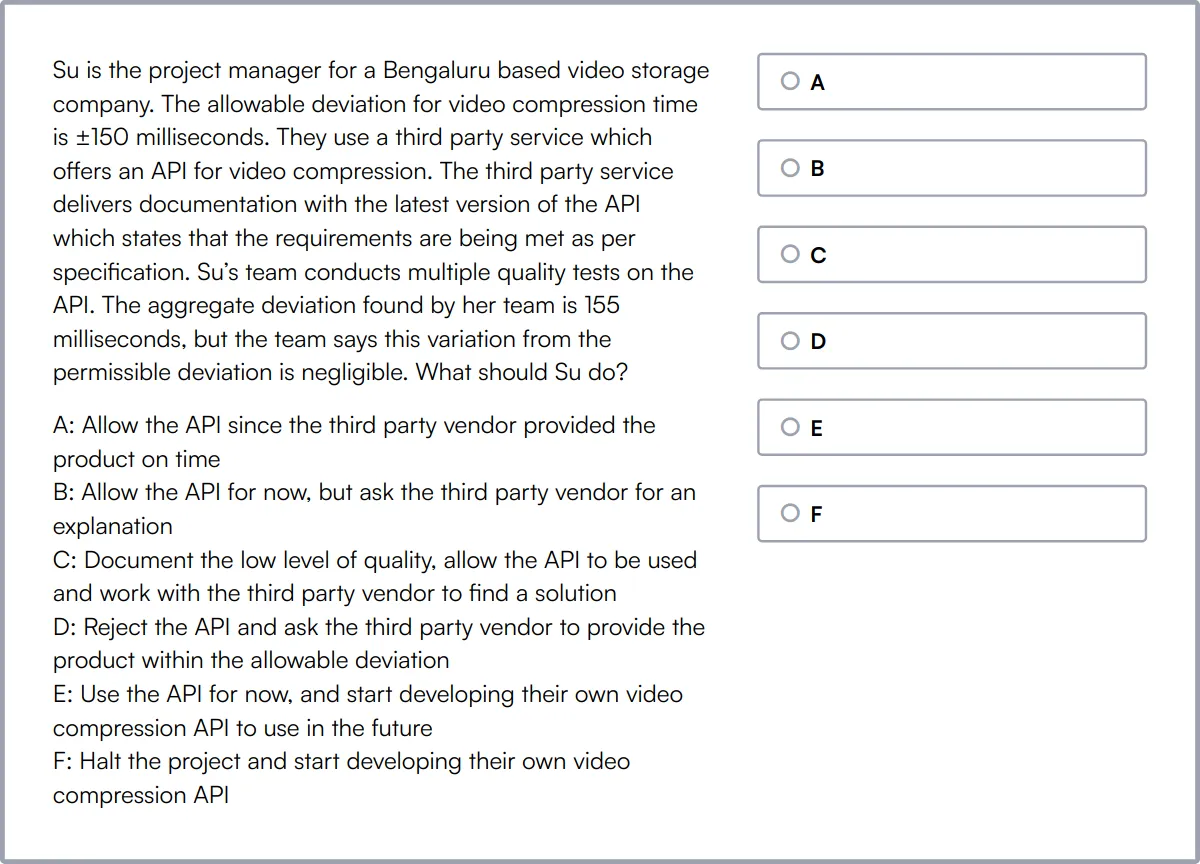
Financial Accounting Online Test
Our Financial Accounting Test uses scenario-based multiple-choice questions to evaluate a candidate's knowledge and skills related to financial statements and reporting, accounting principles and concepts, budgeting and forecasting, tax compliance and planning, auditing and internal controls, financial analysis and decision-making, and financial software and tools.
The test covers financial statements, accounting principles, double-entry bookkeeping, assets and liabilities, income and expense recognition, and financial ratios. It also assesses knowledge of cash flow statements, inventory valuation, depreciation and amortization, and financial analysis.
Candidates are evaluated on their ability to interpret and analyze financial data, apply accounting standards and regulations, and communicate financial information effectively to stakeholders.
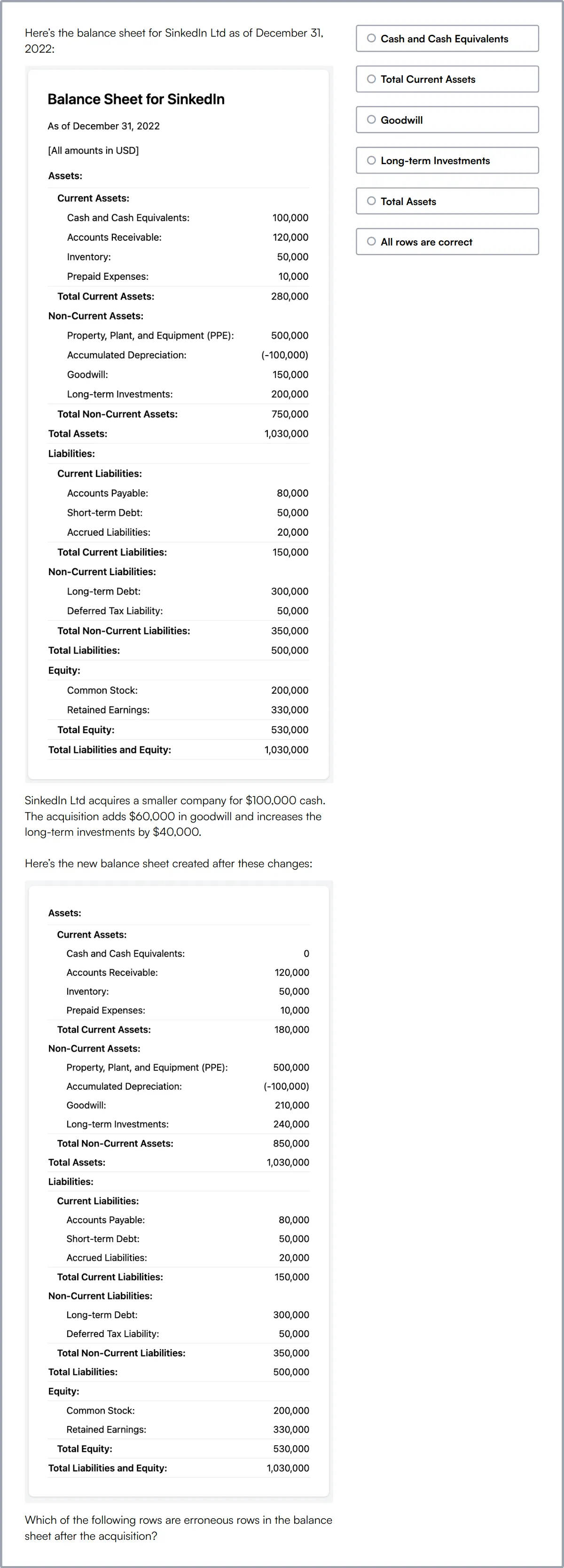
Leadership Psychometric Test
Our Leadership Psychometric Test evaluates candidates on their personality traits and cognitive abilities through scenario-based MCQs. The test covers the Big 5 personality traits, situational judgment, logical reasoning, verbal reasoning, and spatial reasoning.
The test assesses traits such as conscientiousness, agreeableness, openness, extraversion-introversion, and neuroticism. It also evaluates emotional intelligence, conflict management, communication skills, decision making, problem solving, time management, strategic thinking, and spatial intelligence.
Successful candidates demonstrate strong emotional intelligence, effective conflict management, and the ability to make sound decisions and solve problems efficiently.
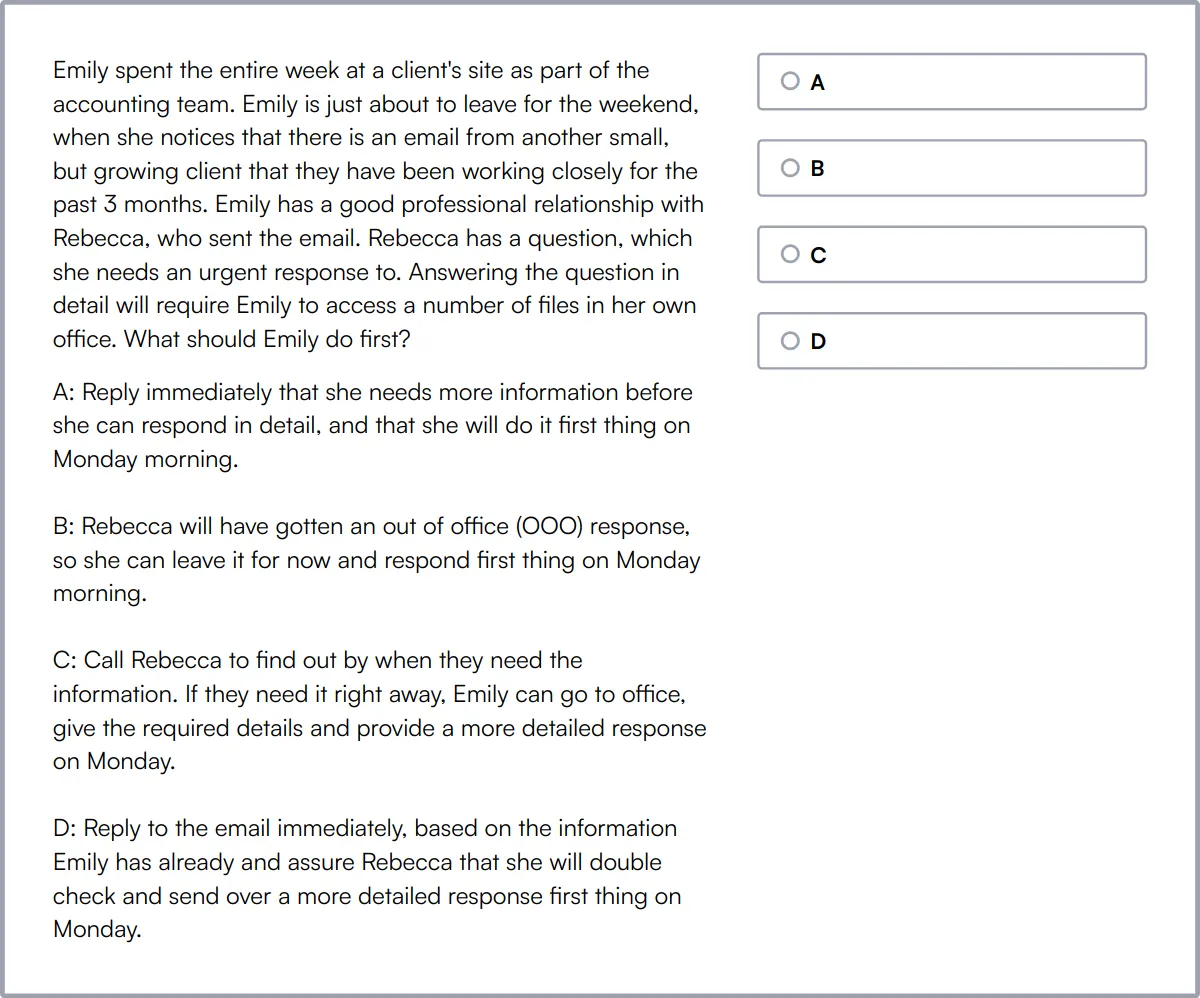
Communication Skills Test
Our Communication Skills Test evaluates candidates' communication skills, including verbal and written communication, active listening, and interpersonal skills. It is designed to assess their ability to effectively communicate with customers, colleagues, and stakeholders in various professional scenarios.
The test covers communication skills, situational judgement, attention to detail, critical thinking, and verbal reasoning. It includes scenario-based questions to evaluate how candidates handle real-world communication challenges.
Candidates who perform well demonstrate strong verbal and written communication skills, the ability to actively listen, and effectively interact with stakeholders.
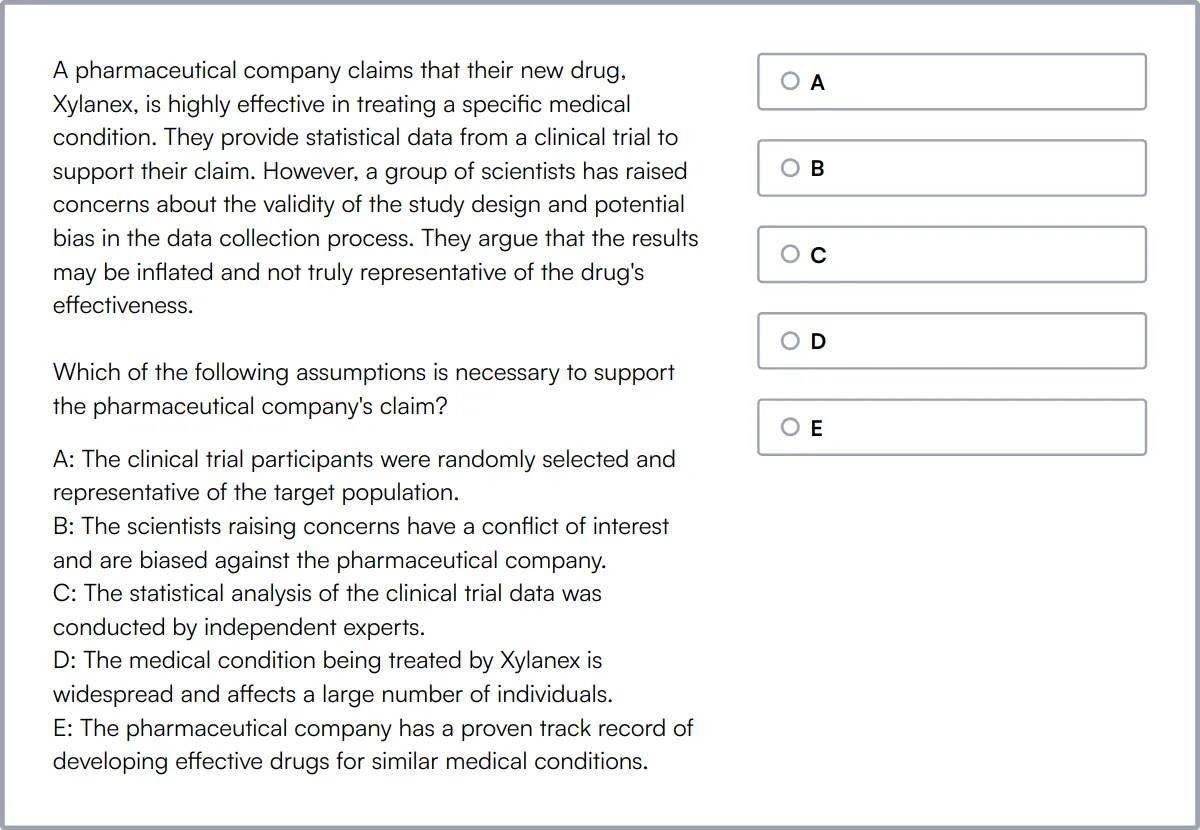
QA Engineer Test
Our QA Engineer Test uses scenario-based MCQs to evaluate candidates on their understanding of various testing methodologies, test planning and execution, bug tracking, and test automation frameworks.
The test covers quality assurance (QA), testing fundamentals, test design techniques, software life cycle, QA programming, program testing, Selenium fundamentals, and Linux fundamentals. It also includes a coding question to assess practical skills.
Candidates are evaluated on their knowledge of regression testing, test reporting, documentation, and risk assessment. High-scoring candidates demonstrate a strong understanding of test automation frameworks and the ability to effectively plan and execute tests.
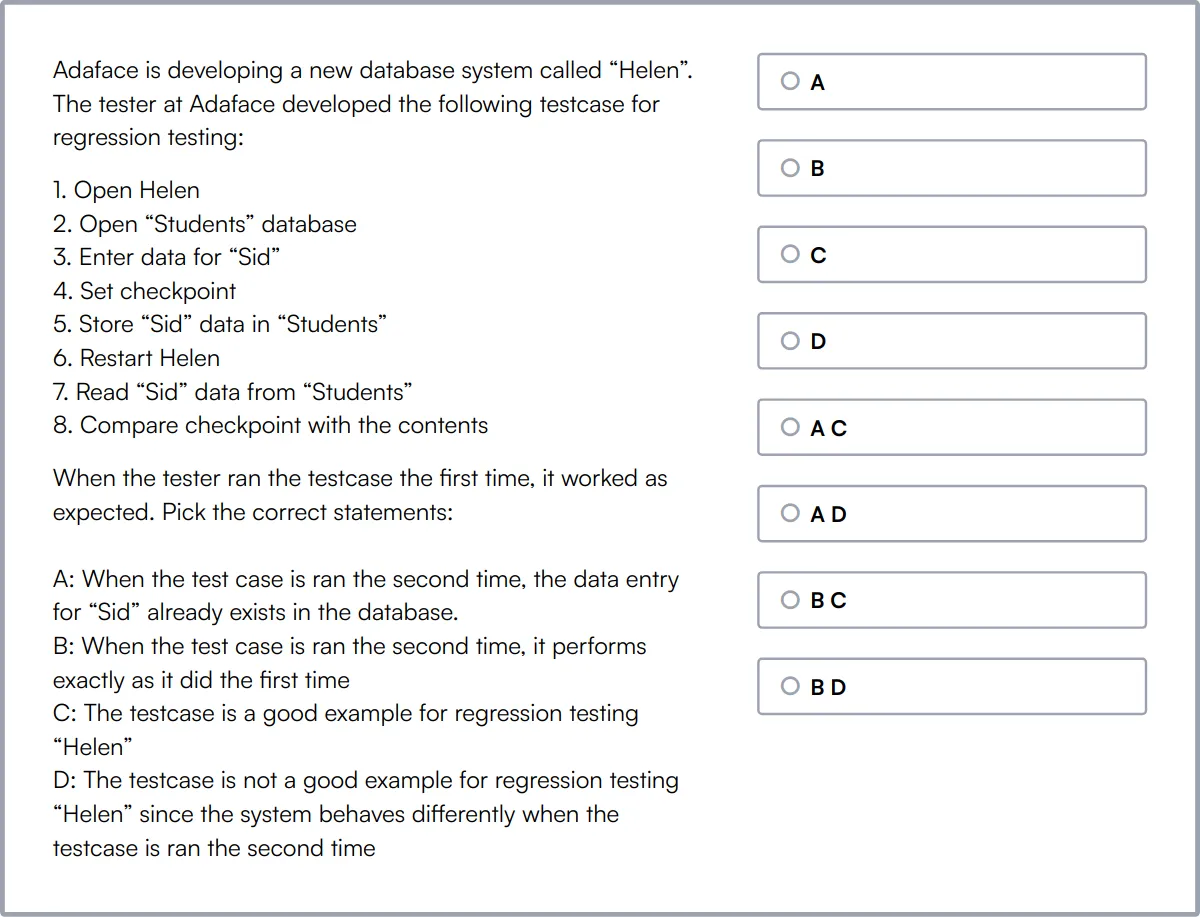
Summary: The 8 key Project Manager skills and how to test for them
| Project Manager skill | How to assess them |
|---|---|
| 1. Project Planning | Evaluate the ability to create detailed, actionable project plans. |
| 2. Risk Management | Assess the skill in identifying and mitigating potential project risks. |
| 3. Budget Management | Check proficiency in planning and controlling project budgets. |
| 4. Team Leadership | Gauge the capability to lead and motivate a project team. |
| 5. Communication | Determine effectiveness in conveying information clearly to stakeholders. |
| 6. Quality Control | Evaluate the methods used to ensure project deliverables meet standards. |
| 7. Stakeholder Management | Assess the ability to manage and satisfy stakeholder expectations. |
| 8. Time Management | Check skills in prioritizing tasks and meeting project deadlines. |
Project Management Test
Project Manager skills FAQs
How can recruiters assess a candidate's project planning skills?
Recruiters can evaluate project planning skills by asking candidates to describe past projects they've managed, focusing on how they structured the project timeline and resources. Behavioral interview questions or case studies can also reveal their planning capabilities.
What techniques can be used to evaluate risk management abilities in project managers?
To assess risk management abilities, recruiters should ask candidates to share examples of unforeseen challenges they faced in previous projects and how they mitigated those risks. Additionally, presenting hypothetical risk scenarios during interviews can help gauge their analytical and decision-making skills.
What are effective ways to measure a project manager's budget management skills?
Recruiters can measure budget management skills by discussing specific instances where the candidate had to manage a project budget. Questions about how they optimized spending and handled budget overruns will provide insights into their financial acumen.
How can team leadership be assessed during the hiring process for a project manager?
Assessing team leadership can be done through behavioral interview questions that ask candidates to describe how they have led teams in past projects. Observing their interaction in group interview settings or through leadership assessment tools can also provide valuable insights.
What methods can help determine a project manager's effectiveness in stakeholder management?
To determine a candidate's stakeholder management skills, recruiters can ask about their experience working with diverse stakeholder groups and strategies they used to manage expectations and communications. Role-playing exercises can also simulate stakeholder interactions.
How can recruiters evaluate a project manager's adaptability?
Evaluating adaptability involves asking candidates about times when they had to adjust to significant changes during a project. Their responses to questions about dealing with shifting deadlines, project scopes, or team dynamics can highlight their flexibility.
What are the best ways to assess conflict resolution skills in project managers?
Conflict resolution skills can be assessed by asking candidates to describe specific conflicts they have resolved in the workplace. Role-play scenarios involving conflict situations can also test their ability to mediate and resolve issues effectively.
How can technical proficiency be evaluated in project managers during recruitment?
Technical proficiency can be evaluated by discussing the candidate's experience with project management tools and methodologies. Technical assessments or practical tasks related to the specific tools or software used in your organization can also be effective.

40 min skill tests.
No trick questions.
Accurate shortlisting.
We make it easy for you to find the best candidates in your pipeline with a 40 min skills test.
Try for freeRelated posts
Free resources



